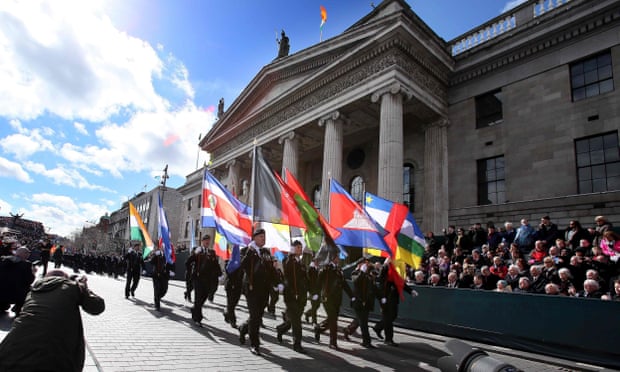| Irish Volunteers on the March, April 24, 1916. |
Today
is the 100th anniversary of the Declaration
of Martial Law in Dublin after the Irish Volunteers, Irish
Citizen’s Army, the 200 women members of Cumann na mBan, and a small
force of Hibernian Rifles seized key
buildings in Dublin, including the General Post Office and
read the Proclamation of the Irish
Republic. It was, by no coincidence,
Easter Monday.
In the five bloody days that followed the Royal
Navy shelled the
city and thousands of troops poured in eventually crushing the rebellion with heavy casualties. All seven signatories of the Proclamation
including Padraig
Pearce and the wounded socialist and
radical labor
unionist James Connolly and
seven others, including men who were not even directly involved, were executed
by firing squads.
Over 1,500
rebels were placed in virtual concentration camps where they met in secret and plotted revolution.
 | |
| The official Dublin observance of the Centennial included a military parade past the General Post Office, site of the most intense battle of the Rising. |
In
Ireland the centennial will be celebrated
and observed all year. There are ongoing museum exhibitions, academic
conferences, broadcast programing,
and loads of cultural events. There
have been and will continue to be street
demonstrations and political manifestations
that tie the Rebelion to today’s
events. But the official Dublin observations of the
anniversary will not occur today. They
happened weeks ago centering around a grand
parade, fireworks, and oratory
on Easter Sunday. If following the ancient Hebrew lunar calendar that made Easter a movable feast seems odd, you fail to
comprehend the iron cultural grip of
the Catholic Church on the Irish Republic which only now is beginning to crumble.
When the crypto-fascist
and hyper Catholic Eamon DeVallera and his Fianna Fáil political party
took power after the Irish Civil War,
all authority over Irish education, health care, and social
welfare programs was simply turned
over to the Catholic Church which also dictated moral and social
legislation. The strictest bans on divorce and abortion in Europe have continued long after social change overtook the rest of the western world.
But in recent years the Church’s dominance has been severely weakened first
by wave upon wave of revelations of pedophilia and sexual abuse
by the clergy and more recently the scandals around the Magaline laundries where single mothers were sent, kept in virtual slavery in harsh conditions, and where thousands of their children died of neglect, disease, and malnutrition or were adopted out without the mother’s consent or knowledge. In addition,
young Irish men and women are among the best
educated in Europe and many have spent years living and working
abroad. They have come back to Ireland
with the cosmopolitan values of the wider world. Many have adopted the secularism that is the European
norm. Apostasy is up, church attendance has plummeted, and even among the remaining faithful there is a rejection of many traditional Catholic social teachings.
One result is, for the first time, a secular movement in favor of strong church-state separation
including, among other things, moving future Easter Rebellion commemorations to
the calendar anniversary.
In
1918 led by American
born DeVallera and Michael Collins, both Republican veterans formed the Sinn Fein political party which swept elections for the Irish members of the British Parliament. Instead the erstwhile MPs met in
Dublin, established the revolutionary
parliament, Dáil
Éireann and a made a new Declaration of Independence in January 1919.
That set off a bloody revolutionary war.
There
is far more to the tragic story than
there is space here to tell it.
The sacrifices of the men and women of
the 1916 Rising continue to reverberate
to this day on the still divided island
of Ireland.
William Butler Yeats, generally listed along with Anglo-American T.S.
Eliot as one of the greatest
English Language poets of the 20th Century, witnessed the Rising but did not participate. In fact at first he
was ambivalent at first as were many
surprised Dubliners. But he
was moved by the executions of the
leaders. Easter, 1916
is one of his most powerful poems
and became a Republican rallying cry.
It is always read at annual
commemorations of the Rising in Dublin.
| William Butler Yeats. |
Passover/Earth
Day
April 23, 2016
What if there
were no Passover?
What if no sacrificial blood
smeared on the lintel
offered any protection?
What if there
were no Us and Them?
What if the Pharaoh’s son
and our sons fell alike
from the same dark curse?
What if the Dark
Angels were not Yahweh’s?
What if they were our creation,
evoked by our carelessness
and fed by our greed?
What if there
were no where to flee?
What if no haven or Promise Land
lay waiting even after wandering
because we have laid waste to it
too?
What if there
were no Milk and Honey?
What if our goats all starved,
we killed the bees
and parched the earth bare?
What if there were
no Seder tables to lay?
What if there were no progeny
to ask what makes this night different,
no generations ever again?
What if this is
no mere nightmare?
—Patrick
Murfin
No comments:
Post a Comment